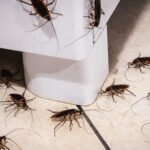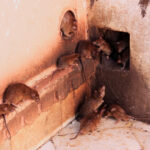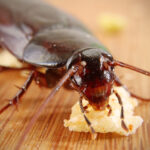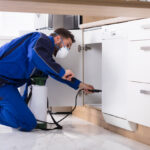Pest Prevention Tips: 15 Tips for a Pest-Free Environment
- Pest Prevention Tips: 15 Tips for a Pest-Free Environment
- The Importance of Pest Prevention
- Maintain a Clean and Organised Home
- Seal All Entry Points
- Proper Food Storage
- Responsible Waste Disposal
- Garden Maintenance
- Utilise Natural Repellents
- Employ Traps and Baits
- Engage a Pest Control Professional
- Keep Pets Groomed and Healthy
- Safe Pesticide Use
- Avoid Indoor Use of Outdoor Chemicals
- Moderation with Pesticides
- Landscape Wisely
- Sanitize Surfaces
- Ensure Good Ventilation
Pest Prevention Tips: 15 Tips for a Pest-Free Environment
A proactive approach will make all the difference in keeping pests at bay. We have a wealth of knowledge on preventing infestations and maintaining a pest-free environment. By implementing our advice, you can create a barrier against unwanted intruders in your home. Throughout this blog, I will highlight the most important aspects of pest prevention. These practical tips will safeguard your living space and create a healthier and more comfortable environment.
The Importance of Pest Prevention
Preventing pests from entering your Home or Office is critical to avoiding infestations. By implementing these best practices below, you can safeguard everyone against potential health hazards
So don’t wait for a full-blown infestation; take preventative measures today to protect your property from unwanted intruders! With proper pest prevention methods and techniques, you can have peace of mind knowing that you are doing everything possible to prevent future pest problems.
Maintain a Clean and Organised Home
A clean and organised home is crucial for pest prevention as it eliminates potential food sources and hiding places for pests. Clutter and uncleanliness provide ideal environments for pests like rodents, ants, and cockroaches to thrive. Regular cleaning and tidying reduce these opportunities, making the home less inviting to pests.
Seal All Entry Points

Proper Food Storage
Proper food storage denies pests easy access to food sources, significantly reducing the likelihood of infestations. When left exposed, food attracts pests like ants, rodents, and cockroaches, contaminating it with harmful pathogens. You minimise these risks by storing food in airtight containers and keeping it in sealed cabinets or pantries. Proper storage keeps your home hygienic and helps maintain its integrity by discouraging pest invasions.
Responsible Waste Disposal
Proper food storage is just one piece of the pest prevention puzzle. Responsible waste disposal is crucial in reducing pest populations. Improperly disposing of leftover food items can attract pests.
Proper handling and disposal of waste, including leftover pesticides, is essential to prevent environmental and wildlife harm.
Garden Maintenance
Regularly maintaining and caring for your garden is essential for keeping pests at bay and ensuring a healthy outdoor environment. Trim bushes and trees to deter pests from using them as entry points and remove any standing water that might attract them. Keeping your garden clean will eliminate potential hiding spots, and you should also consider using wire mesh to address pest issues in the soil. If you’re an outdoor person, I’m sure you would benefit from our post all about Outdoor Pest Prevention.
Utilise Natural Repellents
Utilising natural repellents can be an effective and eco-friendly way to keep pests at bay in your home, garden or business.
Essential oils like peppermint and eucalyptus deter pests, while herbs such as basil, lavender, and rosemary repel insects like mosquitoes and flies.
Diatomaceous earth dehydrates insects, acting as a natural pest control measure. Creating sprays with essential oils or planting pest-repelling herbs can help maintain a pest-free environment.
Employ Traps and Baits
Enhancing your pest control strategy with traps and baits can be a targeted and efficient method to combat unwanted intruders in your home or garden.
We recommend strategically using traps and baits to manage pests without excessive pesticide use. Traps come in humane or lethal options to catch or eliminate pests like rodents and insects. Baits lure pests with food or pheromones, aiding in their eradication.
Engage a Pest Control Professional
Considering the complexities of pest infestations and their potential risks, engaging a pest control professional to safeguard your property is prudent.
Pest control experts can accurately assess infestations, offer tailored solutions, and prevent recurring issues by addressing root causes. We effectively manage pests with specialised tools and proactive strategies, reducing property damage and health risks.
Keep Pets Groomed and Healthy
Prioritising your pets’ grooming and overall health is crucial to maintaining a pest-free home. Regular grooming, vet check-ups, brushing, and bathing can reduce the chances of tick or flea infestations. Properly disposing of pet waste also reduces the attraction of pests like fleas and mites and deters flies and rodents.
A clean and hygienic space for your pets contributes to a pest-free home.
Safe Pesticide Use
Implementing safe pesticide use practices is essential for managing pest issues while prioritising the well-being of your family and pets. Always keep pets and children away from treated areas, and consider using baits as a safe first line of defence. Be sure to follow labels diligently for safe and effective chemical use.
Avoid transferring pesticides to other containers; store them in their original packaging and maintain proper labels and safety information.
Mix only the necessary amount to reduce waste and hazards. To prevent contamination, don’t repurpose empty pesticide containers for other liquids. Dispose of them according to label recommendations or through hazardous waste collection services.
Avoid Indoor Use of Outdoor Chemicals
Applying the principles of safe pesticide use also extends to understanding the implications of utilising outdoor chemicals indoors. Outdoor chemicals, with higher toxicity levels and different formulations, can pose health risks when used inside. Lack of proper ventilation in indoor spaces can lead to harmful fume exposure.
Moderation with Pesticides
The use of pesticides must be approached with moderation to protect the environment, human health, and biodiversity. Overuse can lead to pest pesticide resistance, making them harder to control over time. It can also harm non-target species, including beneficial insects, birds, and aquatic life, disrupting ecosystems. Excessive pesticide application poses health risks to humans, potentially causing respiratory problems and other illnesses.
Landscape Wisely
Implementing smart landscaping practices is crucial for keeping pests at bay and maintaining a healthy outdoor environment. Choose pest-resistant plants, cedar or cypress mulch, and create barriers with gravel or rocks to deter pests.
Trim vegetation to eliminate hiding spots and ensure proper drainage to avoid water accumulation that attracts pests. Trim overhanging branches to prevent pests from using them as access points to your home.
Sanitize Surfaces

Ensure Good Ventilation
Ensure good ventilation for a pest-free home. Proper airflow reduces moisture levels, deterring pests. It also prevents odours that attract pests and regulates temperature and humidity, creating an inhospitable environment for pests.
Well-ventilated spaces discourage dust and debris buildup that pests use for shelter. Good ventilation promotes better indoor air quality, benefiting both humans and deterring pests.
In conclusion, pest prevention measures are key to creating a pest-free environment. Following these tips can effectively deter pests from invading your space, ultimately saving time and money in the long run. Remember, prevention is always better than dealing with a full-blown infestation.
Prevent pests in your home.
At Youngs Pest Control, we would love for you to have a pest-free environment. If you want to learn more about pest prevention, check out our room-specific tips for Attics, Basements, Garages or Seasonal Pest Prevention Tips and advice on how to deal with that location.
📧 Email: [email protected]
🌐 Visit: youngspestcontrol.co.uk

